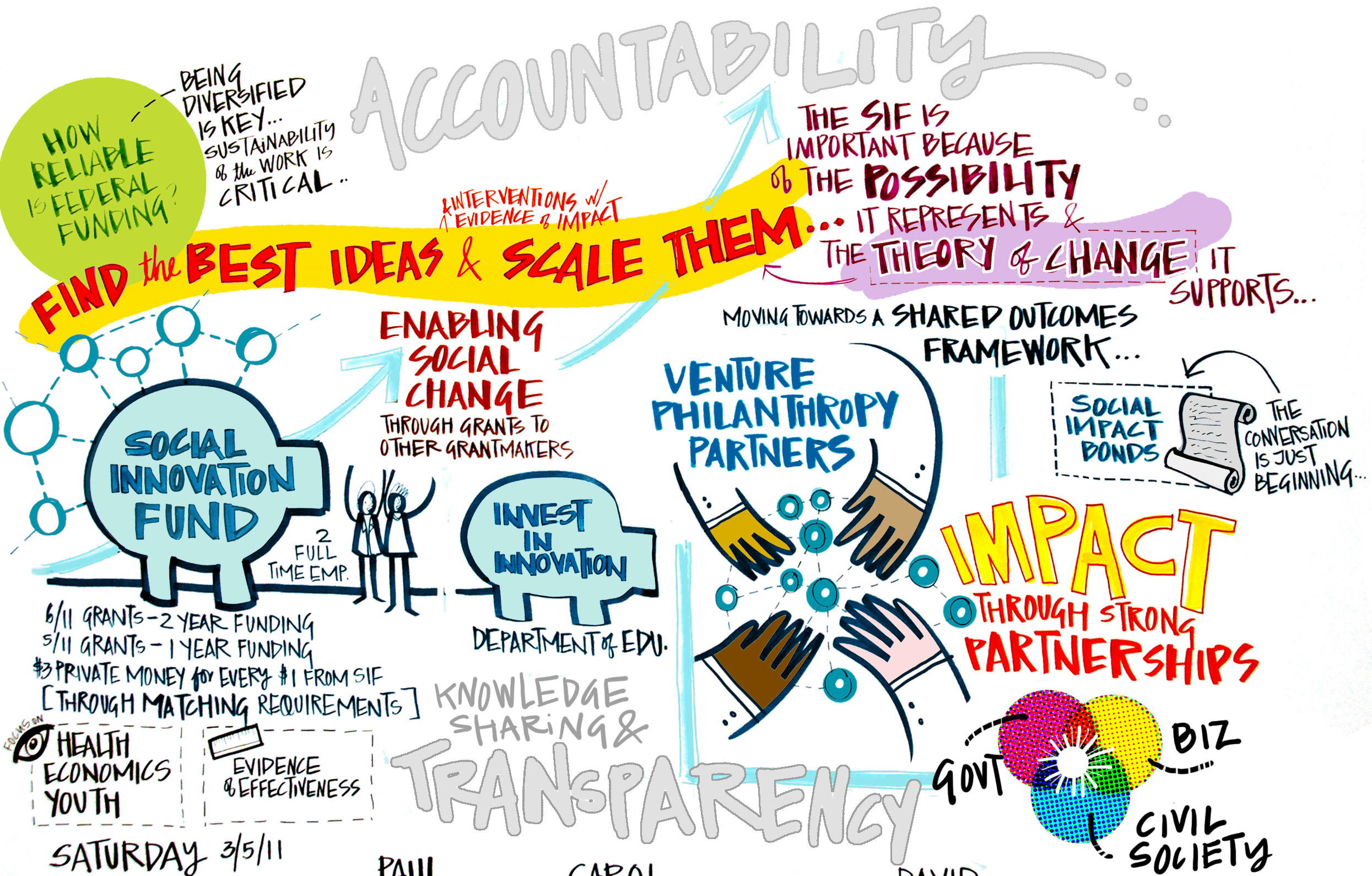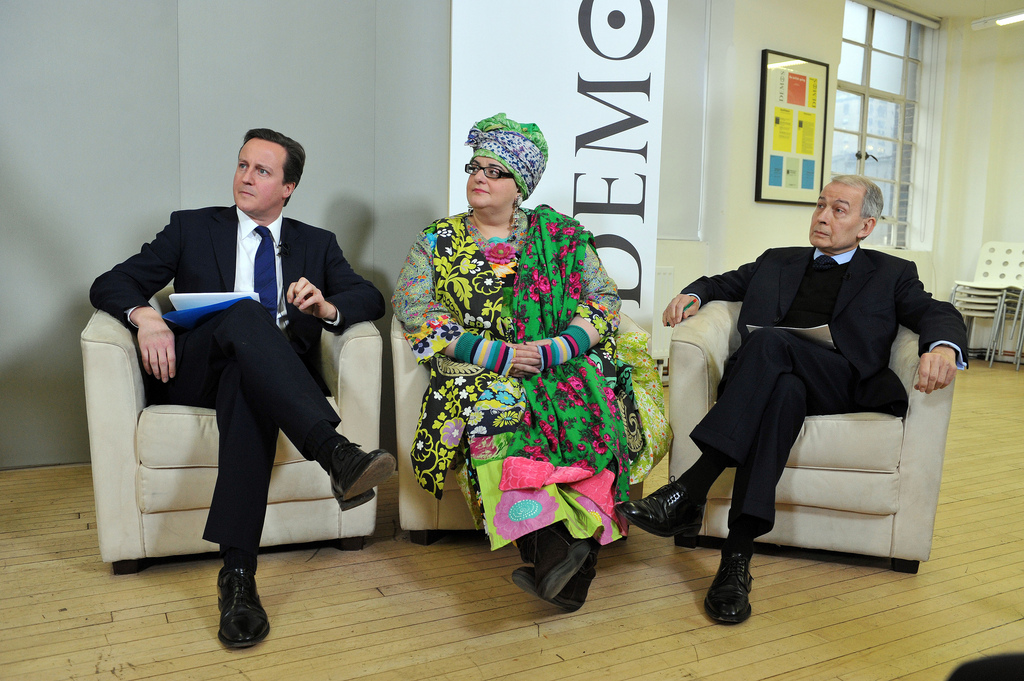By Rebecca Jackson
Public sector cuts under the coalition and current Conservative governments’ programme of austerity have been far reaching and severe. Social enterprises and charities have been promoted by government as a new and effective way to deliver public services in a way which meets the needs of service users but are more cost effective than previous models.
But the closure of Kids Company last month raised questions about the difficulties of outsourcing public services. When a body receives public money, but is ultimately a private organisation or business, who is held responsible for how that money is spent, who is responsible for its regulation and who is ultimately held accountable for its failures?

Photo By Paul Carttar & Carol Thompson Cole w/ David Gergen and dpict.info Free for editorial and/or personal use only. No sales, no commercial use.
Rolling back the state
Estimates suggest there are 70,000 social enterprises in the UK, employing around a million people. Social enterprises and charities have been incorporated extensively into the delivery of public services. This is not only to provide efficiency, but expertise and personalised service in a way that national government-led roll-outs could not. There have been a number of schemes which have functioned effectively, where social enterprises and charities have successfully integrated to help local authorities deliver public services.
Social enterprises represent an alternative way of doing business in the UK; one which promotes investment in communities and projects which promote sustainability and collaboration. They include organisations from the economic, social, cultural and environmental sectors. Their diversity is one of their major advantages.
However some more sceptical about their use have commented that a growing government obsession with outsourcing public services, to both the private and third sector, has created a “shadow state”. Increasingly people have begun to question whether this approach is a sustainable or suitable method for the delivery of public services in the UK. There’s no doubt that social enterprises provide an alternative approach to service delivery, but at what cost to the taxpayer and government legitimacy?
Questions of legitimacy and authority
Founded in 1996 by Camila Batmanghelidjh in south London, Kids Company provided a range of services to vulnerable children in London, Liverpool and Bristol. Its high profile supporters within government included David Cameron. However Kids Company was forced to close after a very public “funding crisis”. Now there are questions over exactly whose responsibility it was to make sure that the money given to Kids Company by government was spent correctly and who is liable for the failure of the charity and the potential loss of £3m of public money.
There are two key issues. The delivery of specialist services to improve outcomes for hard-to-reach groups, is not easy or cheap. Commissioning these services from the third sector, when there are recognised issues with their ability to access sustainable finance and investment, as well as workforce and skills issues within the sector, is never going to be straight-forward. The situation of Kids Company is actually very unusual as sector surveys show that the main challenge that social enterprises and the voluntary sector face when delivering contracted services is the risk that the focus shifts from the needs of service users to meeting narrow, performance management requirements. Public sector procurement models based on cost and value for money leave little leeway and also put organisations into competition with each other for scarce funding.
Secondly, there is the question of the relationship between transparency, legitimacy and government authority. Kids Company lacked transparency and in the end, by not addressing concerns or applying appropriate scrutiny, government outsourced its authority as well as its services.

Leader of the Conservative Party David Cameron gives a speech at Demos with Frank Field Labour MP for Birkenhead and Camila Batmanghelidjh, Founder and Director of Kids Company, London, Thursday January 7, 2010. Photo By Andrew Parsons
Free for editorial and/or personal use only. No sales, no commercial use.
Answers in the form of regulation?
What exactly went wrong with Kids Company will hopefully emerge in time as a result of the statutory inquiry which was announced last week by the Charities Commission.
Within the existing structure in place in the UK, charities and third sector organisations in England and Wales are held accountable for their practice and conduct by the Charity Commission, while Scotland and Northern Ireland have their own independent regulatory bodies.
However their effectiveness is disputed. Many smaller organisations are left to largely self-regulate. There is no official stance from government on charity regulation, no mandatory standard of practice, only guidance to direct charity conduct. A damning Public Accounts Committee report in 2014 found that “We are dismayed by the fact that the Charity Commission is still performing poorly and failing to regulate the charity sector effectively. It is obvious that it has no coherent strategy and …it is clear that the Charity Commission is not fit for purpose.”
It seems that the government lacks the necessary instruments to scrutinise and challenge the way that charities or third sector organisations operate.
Because of the nature of the organisations involved, what the third sector needs is a regulatory body which is able to effectively set out standards and rules of practice, and explicitly state what is expected of charities in terms of accountability where public funds are concerned, but is not a police force. Too much regulation and scrutiny over charities’ practices would make for a sector which was reluctant to contribute to public services and would reduce their focus on the task of delivering effective public services.
This regulatory challenge is something which needs to be addressed if charities and social enterprises are to continue to be part of the public service delivery structure in the UK.
Want to know more about what we do? Our article Celebrating a different kind of library describes our membership service.
Follow us on Twitter to see what other developments in public and social policy are interesting our research team.
Share
Related Posts
Tackling geographical inequalities is critical for ensuring that all parts of the country have the potential to prosper. When the UK was a member of the European Union, it was entitled to a share of funding from the EU’s structural ....
In recent years, there has been an increasing focus on ensuring people with ‘lived experience’ are involved in co-producing research and policy-making at practical, local level. However, there has been little discussion around what the people with lived experience themselves ....
By Robert Kelk and Chris Drake A new start for an old challenge? The recent appointment of Marc Lemaître as the European Commission’s director general for research and innovation (R&I) has returned Europe’s R&I gap to the spotlight. Previously head ....
Today sees the start of Community Garden Week 2023. Across the UK, communities will be celebrating the many and varied types of community gardens, from children’s and neighbourhood gardens to therapy gardens and allotments. The benefits of community gardens are ....
